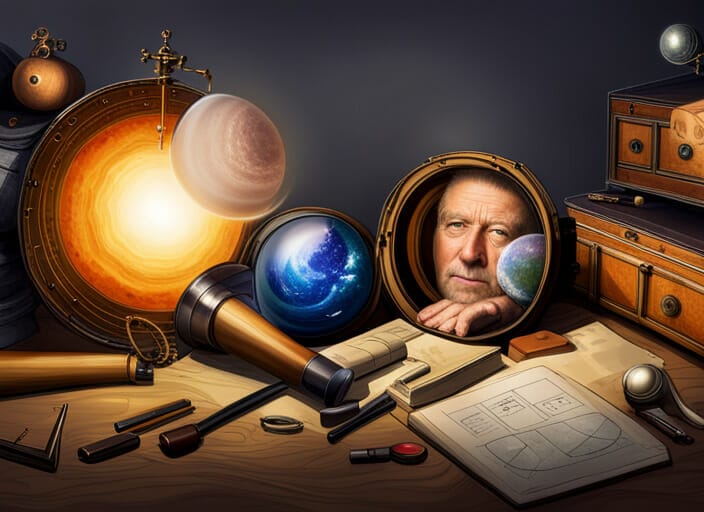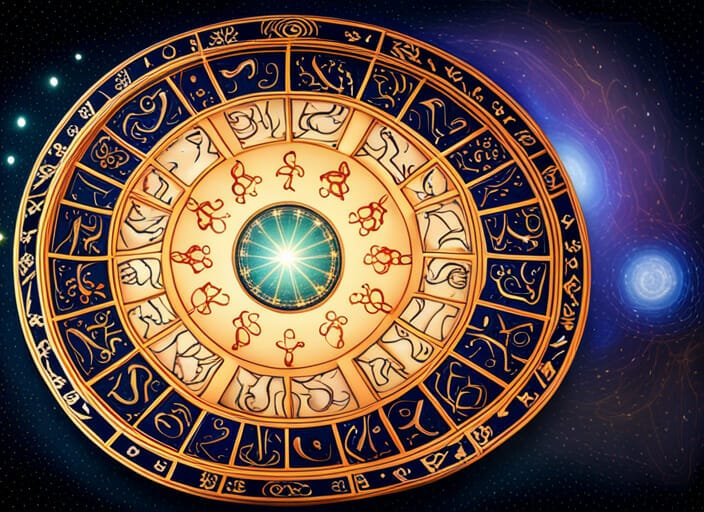Do Astronomers Believe In Astrology?
Step into the vast cosmic expanse, where the stars illuminate the mysteries of the universe. In this boundless realm, you may wonder: do astronomers, those seekers of celestial truth, believe in astrology?
To answer this question, we must delve into the realms of understanding between these two disciplines. Astronomy, with its rigorous scientific inquiry, explores the cosmos with telescopic lenses and mathematical equations. Astrology, on the other hand, seeks to unveil the potential influence of celestial bodies on human lives.
As we embark on this journey, we shall examine the perspectives of astronomers and their views on astrology. Through the lens of scientific evidence and critical analysis, we will unravel the enigmatic relationship between these two realms.
Prepare to traverse the celestial landscape and uncover the paradoxes that lie within as we unravel the truth behind astronomers’ beliefs in astrology.
Key Takeaways
– General consensus among astronomers: astrology is not a valid scientific discipline
– Scientific studies consistently find no evidence to support astrology claims
– Astrology lacks scientific credibility and is dismissed as pseudoscience
– Astronomers generally do not believe in astrology and emphasize objective observations and logical explanations
Understanding Astronomy and Astrology

So, do you really understand what astronomers think about astrology?
There are many misconceptions about astrology, and it is important to differentiate it from astronomy.
While astronomy is a scientific discipline that studies celestial objects and the universe as a whole, astrology is a belief system that suggests celestial bodies can influence human behavior and destiny.
The historical origins of astrology can be traced back to ancient civilizations who observed the movements of celestial bodies and associated them with events on Earth.
However, modern astronomers do not consider astrology to be a valid scientific practice. There is no empirical evidence to support the claims made by astrologers, and astrology does not adhere to the principles of scientific inquiry.
Understanding this distinction is crucial when examining the scientific perspective on astrology.
Now, let’s delve into the scientific perspective and explore why astronomers do not believe in astrology.
The Scientific Perspective

When discussing the scientific perspective on astrology, it is important to consider the concepts of empirical evidence and the scientific method.
Astronomers adhere to these principles, which require observations and experiments that can be repeated and tested.
Astrology lacks scientific validity and predictive power because its claims are not based on empirical evidence or supported by rigorous scientific testing.
Empirical Evidence and the Scientific Method
Although astronomers rely on empirical evidence and the scientific method, they can’t help but feel a sense of exasperation when confronted with the belief in astrology.
As scientists, astronomers base their understanding of the universe on empirical observations and rigorous scientific research. They gather data, analyze it, and draw conclusions based on evidence. This approach allows them to make accurate predictions and understand the workings of celestial bodies.
In contrast, astrology lacks scientific validity and predictive power. It relies on subjective interpretations and generalizations without any basis in empirical evidence. Astronomers find it frustrating to see astrology being taken seriously, as it goes against the principles of scientific inquiry.
Despite its popularity, astronomers recognize astrology as a pseudoscience that lacks the scientific rigor necessary for credible understanding of the cosmos.
Lack of Scientific Validity and Predictive Power
Astrology’s lack of scientific validity and predictive power leaves it as a mere illusion in the vast realm of the cosmos.
Scientific skepticism surrounding astrology stems from the fact that its claims are not supported by empirical evidence or the scientific method. Astronomers, who study the celestial bodies and their interactions, rely on rigorous scientific inquiry to understand the universe.
In contrast, astrology is based on cultural beliefs and subjective interpretations of celestial events. The lack of scientific validity is evident in astrology’s inability to make accurate predictions or provide consistent results.
While some may find comfort or entertainment in astrology, it is important to recognize its limitations and separate it from the rigorous scientific discipline of astronomy.
Transitioning into the subsequent section about astronomical discoveries and astrological claims, it becomes clear that the two realms are fundamentally different in their approach and findings.
Astronomical Discoveries and Astrological Claims

When it comes to discussing astronomical discoveries and astrological claims, two key points often arise.
One point is the relationship between zodiac signs and constellations. The zodiac signs, based on the ancient Babylonian system, divide the sky into twelve equal parts. Each sign is represented by a specific constellation.
However, another point to consider is the precession of the equinoxes. Over time, the position of the constellations has shifted due to this phenomenon. As a result, the traditional zodiac signs are now out of alignment with the actual positions of the constellations.
This scientific understanding challenges the validity of astrological claims that rely on the alignment of zodiac signs with specific personality traits or future events.
Zodiac Signs and Constellations
Furthermore, astronomers find the connection between zodiac signs and constellations to be purely coincidental. The alignment of zodiac signs with specific constellations is not based on any scientific evidence or celestial events. Here are some key points that support this view:
– Historical origins: The zodiac signs and constellations were established by ancient civilizations thousands of years ago, based on their observations of the night sky. However, these observations were not grounded in scientific principles.
– Lack of correlation: The positions of the constellations have shifted over time due to a phenomenon known as the precession of the equinoxes. This means that the zodiac signs no longer align with the actual constellations they are named after.
– Astrological interpretations: Astrology assigns specific meanings and personality traits to each zodiac sign. However, these interpretations lack scientific evidence and are often generalized to fit any individual.
– Astronomical perspective: Astronomers focus on studying the physical properties and movements of celestial objects, rather than making predictions or drawing connections between zodiac signs and human behavior.
Looking beyond the zodiac signs and constellations, let’s explore the impact of the precession of the equinoxes on astrology.
The Precession of the Equinoxes
Now that we have explored the relationship between zodiac signs and constellations, let’s delve into the fascinating phenomenon known as the precession of the equinoxes.
This gradual shift in the Earth’s axis has significant effects on the positions of the stars and the constellations over thousands of years. As the Earth wobbles on its axis like a spinning top, it causes the coordinates of the celestial equator and the ecliptic to change.
This means that the position of the Sun during the vernal equinox, which marks the beginning of the astrological year, slowly moves through the zodiac signs over time.
The precession of the equinoxes has been of historical significance, with ancient cultures using it to track time and navigate the celestial sphere. Understanding this celestial motion provides valuable insights into the astronomical basis of astrology.
Astronomers’ Views on Astrology

Astronomers, as scientists who study celestial objects and phenomena, approach astrology from a rational and evidence-based perspective. While individuals within the field may hold personal beliefs about astrology, the general consensus among astronomers is that astrology is not a valid scientific discipline.
Astronomers understand that astrology lacks a scientific foundation and is based on the belief that the positions and movements of celestial bodies can influence human behavior and personality traits. However, numerous scientific studies have consistently found no evidence to support such claims.
Despite this, astrology continues to have a significant impact on society, with many people finding comfort and guidance in its predictions. This influence can be seen in popular culture, where astrology is often referenced and portrayed.
Astrology in Popular Culture

Astrology in popular culture is a fascinating subject that captivates and shapes the beliefs and interests of millions of people. In modern society, astrology is pervasive, with horoscopes and astrology-themed content found in newspapers, magazines, and online platforms. It offers individuals a glimpse into their personality traits, providing a sense of self-understanding and guidance. Many people turn to astrology as a way to navigate their relationships, career choices, and personal growth.
In popular culture, astrology has become a means of entertainment and self-expression. It has spawned a market for astrology-themed merchandise, such as clothing, jewelry, and home decor. Additionally, astrology has found its place in social media, with memes and astrology-related content being widely shared and discussed.
However, it is important to acknowledge the divide between astronomy and astrology and how it impacts the perception and acceptance of astrology within the scientific community.
Conclusion: The Divide between Astronomy and Astrology

The stark contrast between the scientific rigor of astronomy and the subjective interpretations of astrology has created a chasm that is difficult to bridge. Astronomers, who rely on empirical evidence and the scientific method, generally do not believe in the legitimacy of astrology. They view astrology as lacking in scientific credibility and dismiss it as pseudoscience.
Astronomers emphasize the importance of objective observations and logical explanations, whereas astrology relies heavily on personal belief and subjective interpretations. While some astronomers may have a personal interest in astrology or acknowledge its cultural significance, they maintain a clear distinction between the two fields.
Ultimately, the divide between astronomy and astrology is rooted in their differing approaches to understanding the universe, with astronomers prioritizing empirical evidence and astrology relying on personal belief and interpretation.
Frequently Asked Questions
How are astronomy and astrology related?
The relationship between astronomy and astrology is historical. Astronomy is the scientific study of celestial objects, while astrology is a belief system that suggests a connection between celestial events and human behavior.
What are some examples of astronomical discoveries that are used to support astrological claims?
Astrology claims are often supported by astronomical discoveries, such as the alignment of planets or the positions of constellations. These examples provide scientific evidence that astrologers use to validate their claims.
Do astronomers believe that astrology has any scientific basis?
Astronomers are skeptical of astrology due to the lack of scientific evidence supporting it. They rely on astronomical evidence to understand the universe, but astrology lacks the rigorous methodology and empirical data required in scientific research.
How has astrology been portrayed in popular culture?
Astrology has been portrayed in popular culture through movies, which often depict it as a mystical and accurate practice. However, its influence on daily horoscopes is largely based on general statements and lacks scientific evidence.
What are some key differences between astronomy and astrology?
Astronomy and astrology have key differences. Astronomy is a scientific study of celestial objects while astrology is a pseudoscientific belief system that claims celestial positions affect human behavior.
Conclusion
In conclusion, astronomers firmly reject astrology as a valid scientific practice. They view astrology as pseudoscience that lacks empirical evidence and relies on subjective interpretations.
An interesting statistic that highlights this point is that a study conducted among professional astronomers found that only 2% of them believed in astrology. This demonstrates the overwhelming consensus within the scientific community that astrology is not a credible field of study.
Astronomy, on the other hand, continues to make significant strides in understanding the universe through rigorous observation and experimentation.






